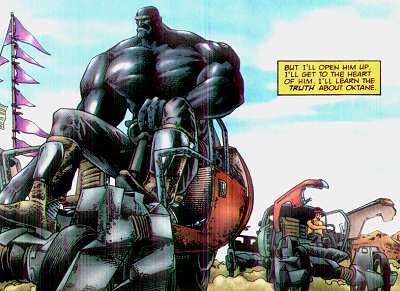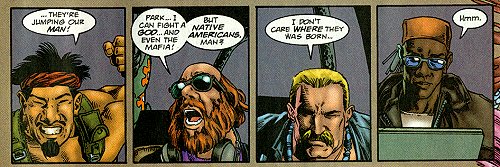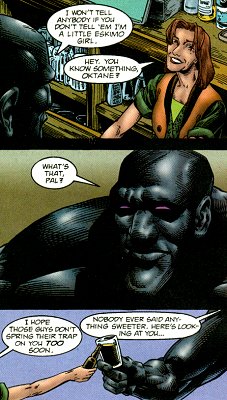
 Oktane
(Dark Horse)
Oktane
(Dark Horse)by Gerard Jones and Gene Ha, with Andrew Pepoy
4-issue mini-series, now collected in paperback
Rating:
![]() "So there you have it. Another Jones creation that thrills the pros and baffles the fans."
"So there you have it. Another Jones creation that thrills the pros and baffles the fans."
![]() That was Gerard Jones' response following a slew of rave reviews from Kurt Busiek,
Mark Waid, Mark Wheatley, Mark Badger, Sam Hamm, and Fabian Nicieza, followed by a
bunch of more tentative letters from plain ol' readers. To some extent, I think he's
right.
That was Gerard Jones' response following a slew of rave reviews from Kurt Busiek,
Mark Waid, Mark Wheatley, Mark Badger, Sam Hamm, and Fabian Nicieza, followed by a
bunch of more tentative letters from plain ol' readers. To some extent, I think he's
right.

![]() Oktane is a half-man, half-machine giant with an 8-track tape player in his forehead, and
a mysterious past. The story is set in the 21st century, in a land featuring many of the
standard post-apocalyptic cliches (hot-rodders roaming the desert, ruined cities), but
these are the result of the country devolving along its current path, not some trite
nuclear armageddon. For example, Las Vegas is crumbling from neglect, as state after
state has turned to gambling to shore up their faltering finances. (Michigan voters
recently approved a measure to allow a handful of casinos in Detroit.)
Oktane is a half-man, half-machine giant with an 8-track tape player in his forehead, and
a mysterious past. The story is set in the 21st century, in a land featuring many of the
standard post-apocalyptic cliches (hot-rodders roaming the desert, ruined cities), but
these are the result of the country devolving along its current path, not some trite
nuclear armageddon. For example, Las Vegas is crumbling from neglect, as state after
state has turned to gambling to shore up their faltering finances. (Michigan voters
recently approved a measure to allow a handful of casinos in Detroit.)
![]() I think what baffled most of Oktane's original readers (including me) is trying to figure
out just what Jones is trying to say. The story is filled with over-the-top satire, which
somehow manages to be very subtle. For example, what does it mean that Oktane rewrites his
origin story to appeal to whatever sympathies the listener has (no matter how outlandish
that makes the tale)? What is Jones saying when he depicts Italian mafia bosses whining
about how the "ethnics" they used to sell crack to have taken over most of their business?
He's obviously saying something... but what?
I think what baffled most of Oktane's original readers (including me) is trying to figure
out just what Jones is trying to say. The story is filled with over-the-top satire, which
somehow manages to be very subtle. For example, what does it mean that Oktane rewrites his
origin story to appeal to whatever sympathies the listener has (no matter how outlandish
that makes the tale)? What is Jones saying when he depicts Italian mafia bosses whining
about how the "ethnics" they used to sell crack to have taken over most of their business?
He's obviously saying something... but what?
![]() Gene Ha's art is anything but ambiguous. I believe this is the first work of his that I've
seen, but I hope it's not the last. His people all look like individual people, and his
non-people (such as Oktane or God Zero, a bizarre monster who looks like refugee from
the early issues of Shade the Changing Man) look enough like real people to fit in...
Gene Ha's art is anything but ambiguous. I believe this is the first work of his that I've
seen, but I hope it's not the last. His people all look like individual people, and his
non-people (such as Oktane or God Zero, a bizarre monster who looks like refugee from
the early issues of Shade the Changing Man) look enough like real people to fit in...
 but not enough to be mistaken for human. As one letter-writer (who had seen only
an uncolored preview) pointed out, it's possible to identify the ethnic background of each
character even without the coloring, and this is without Ha resorting to broad stereotypical
caricature.
but not enough to be mistaken for human. As one letter-writer (who had seen only
an uncolored preview) pointed out, it's possible to identify the ethnic background of each
character even without the coloring, and this is without Ha resorting to broad stereotypical
caricature.
![]() And ethnicity is clearly an important element of this story, involving neo-traditionalist
Navajos, a fugitive African-American mayor of Detroit named Mohammed Salaam Ali
(playfully called "Salami" by Oktane), a Korean-American narrator named MacArthur Park,
the aforementioned Italian mafia, and a band of rednecks known as the Tight White Posse.
Jones skewers pretty much all parties, with wry takes on modern Native Americans reclaiming
their lost heritage, appeals to unity among African-Americans or among people of color,
And ethnicity is clearly an important element of this story, involving neo-traditionalist
Navajos, a fugitive African-American mayor of Detroit named Mohammed Salaam Ali
(playfully called "Salami" by Oktane), a Korean-American narrator named MacArthur Park,
the aforementioned Italian mafia, and a band of rednecks known as the Tight White Posse.
Jones skewers pretty much all parties, with wry takes on modern Native Americans reclaiming
their lost heritage, appeals to unity among African-Americans or among people of color,
 anti-intellectual knee-jerk white supremacy, etc. He also gets some jabs in at hippies
and union members. But don't mistake this for smug, "politically incorrect" humour;
Jones is a liberal kinda guy, so you can be sure he's got more in mind than just,
"Aren't they stupid?"
anti-intellectual knee-jerk white supremacy, etc. He also gets some jabs in at hippies
and union members. But don't mistake this for smug, "politically incorrect" humour;
Jones is a liberal kinda guy, so you can be sure he's got more in mind than just,
"Aren't they stupid?"
![]() Despite being a "boy book" by Jones' own admission, the series does have a few good female
characters in it, particularly Dixie, the tavern owner with an ironic soft spot for Oktane,
and the chairwoman of the Navajo nation. They're not especially sympathetic characters...
but then, neither is anyone else.
Despite being a "boy book" by Jones' own admission, the series does have a few good female
characters in it, particularly Dixie, the tavern owner with an ironic soft spot for Oktane,
and the chairwoman of the Navajo nation. They're not especially sympathetic characters...
but then, neither is anyone else.
![]() Perhaps that's part of what makes Oktane difficult to get a handle on: there's no
one whom the reader can latch onto and identify with, because none of the characters is
really a "good guy". Oktane is a self-serving jerk, and the mercenary attitude of most
of the other characters makes it hard to know whom to root for in the ensuing
mêlée. Even the apparent bad guys (God Zero, CIA agent Anderson, the mafiosi)
have tragic weakness that makes them hard to thoroughly despise.
Perhaps that's part of what makes Oktane difficult to get a handle on: there's no
one whom the reader can latch onto and identify with, because none of the characters is
really a "good guy". Oktane is a self-serving jerk, and the mercenary attitude of most
of the other characters makes it hard to know whom to root for in the ensuing
mêlée. Even the apparent bad guys (God Zero, CIA agent Anderson, the mafiosi)
have tragic weakness that makes them hard to thoroughly despise.
![]() And maybe that's what Jones was trying to say, that in this mess we call American society,
we can't simplistically take sides, saying this faction is right and that group is wrong;
we need to stop playing people off each other, and get on with holding things together.
Or maybe not. {shrug}
And maybe that's what Jones was trying to say, that in this mess we call American society,
we can't simplistically take sides, saying this faction is right and that group is wrong;
we need to stop playing people off each other, and get on with holding things together.
Or maybe not. {shrug}
![]() P.S. I loved the gags on the back covers, especially the one on the
last issue. It makes me wish that there really were another issue of Oktane coming out.
P.S. I loved the gags on the back covers, especially the one on the
last issue. It makes me wish that there really were another issue of Oktane coming out.
![]()
© Todd VerBeek, Radio ZeroTM